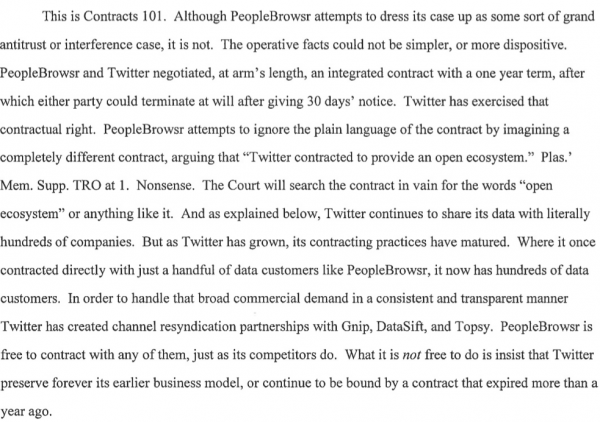PeopleBrowsr-Twitter Case Illustrates Risks Of Building A Business On Third Party Platforms
PeopleBrowsr, the social analytics platform that derives substantially all its data (including its Kred scoring) from access to Twitter’s feed, has fallen victim to Twitter’s recent ambitions to rein in and exercise more control over its ecosystem. The company, which once promised an open platform and developer access to its data “firehose,” has more recently […]
 PeopleBrowsr, the social analytics platform that derives substantially all its data (including its Kred scoring) from access to Twitter’s feed, has fallen victim to Twitter’s recent ambitions to rein in and exercise more control over its ecosystem. The company, which once promised an open platform and developer access to its data “firehose,” has more recently tightened the rules surrounding use of its API.
PeopleBrowsr, the social analytics platform that derives substantially all its data (including its Kred scoring) from access to Twitter’s feed, has fallen victim to Twitter’s recent ambitions to rein in and exercise more control over its ecosystem. The company, which once promised an open platform and developer access to its data “firehose,” has more recently tightened the rules surrounding use of its API.
PeopleBrowsr’s business is fundamentally threatened by these changes. And so it sought (and obtained) a temporary restraining order (TRO) preventing Twitter from cutting off its direct access to the API. Twitter wants PeopleBrowsr to work through designated data resellers Gnip, Topsy and DataSift; however the latter says that these resellers “provide only a small fraction of the data provided by the Firehose, and are not sufficient to support PeopleBrowsr’s products.”
In court documents filed in support of its TRO, PeopleBrowsr is making an “equitable” argument based on notions of fairness and irreparable injury: “PeopleBrowsr built its technology to use the comprehensive data only available through the Twitter Firehose. It spent millions of dollars and over 30,000 hours building products that provide unique insight that cannot be replicated with a smaller data set.”
PeopleBrowsr also argues that Twitter has engaged in anti-competitive behavior by reducing access to its data. For its part Twitter argues that its contract with PeopleBrowsr has simply expired and the company exercised its right to terminate its direct relationship with the social analytics provider. Twitter argues basic legal principles of contract law dispose of the case.
Drawn from Twitter’s court filings, the following is the essence of Twitter’s argument:

The court wouldn’t have granted PeopleBrowsr’s TRO if there weren’t some potential merit to its contentions. However, Twitter is likely to eventually prevail on the basis of the above principles.
No doubt there has been a kind of “bait and switch,” as many companies believed they could rely upon flexible, direct access to Twitter data perhaps indefinitely. PeopleBrowsr is expressing the indignation of many of those companies toward Twitter’s policy changes; but it’s also fighting for its life.
PeopleBrowsr made the fundamental mistake of relying too heavily on one company in designing and building its business. And now, unfortunately, it will probably suffer the consequences.
Contributing authors are invited to create content for MarTech and are chosen for their expertise and contribution to the martech community. Our contributors work under the oversight of the editorial staff and contributions are checked for quality and relevance to our readers. MarTech is owned by Semrush. Contributor was not asked to make any direct or indirect mentions of Semrush. The opinions they express are their own.
Related stories